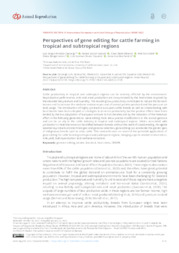Perspectives of gene editing for cattle farming in tropical and subtropical regions.
Perspectives of gene editing for cattle farming in tropical and subtropical regions.
Author(s): CAMARGO, L. S. de A.; SARAIVA, N. Z.; OLIVEIRA, C. S.; CARMICKLE, A.; LEMOS, D. R.; SIQUEIRA, L. G. B.; DENICOL, A. C.
Summary: Cattle productivity in tropical and subtropical regions can be severely affected by the environment. Reproductive performance, milk and meat production are compromised by the heat stress imposed by the elevated temperature and humidity. The resulting low productivity contributes to reduce the farmer?s income and to increase the methane emissions per unit of animal protein produced and the pressure on land usage. The introduction of highly productive European cattle breeds as well as crossbreeding with local breeds have been adopted as strategies to increase productivity but the positive effects have been limited by the low adaptation of European animals to hot climates and by the reduction of the heterosis effect in the following generations. Gene editing tools allow precise modifications in the animal genome and can be an ally to the cattle industry in tropical and subtropical regions. Alleles associated with production or heat tolerance can be shifted between breeds without the need of crossbreeding. Alongside assisted reproductive biotechnologies and genome selection, gene editing can accelerate the genetic gain of indigenous breeds such as zebu cattle. This review focuses on some of the potential applications of gene editing for cattle farming in tropical and subtropical regions, bringing aspects related to heat stress, milk yield, bull reproduction and methane emissions.
Publication year: 2022
Types of publication: Journal article
Unit: Embrapa Dairy Cattle
Keywords: Bovine, Bovino, CRISPR, Estresse térmico, Genome editing, Heat stress, Livestock, Pecuária
Observation
Some of Embrapa's publications are published as ePub files. To read them, use or download one of the following free software options to your computer or mobile device. Android: Google Play Books; IOS: iBooks; Windows and Linux: Calibre.
Access other publications
Access the Agricultural Research Database (BDPA) to consult Embrapa's full library collection and records.
Visit Embrapa Bookstore to purchase books and other publications sold by Embrapa.

